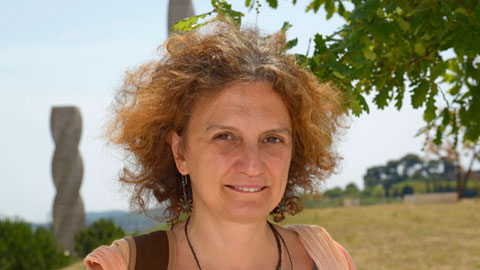"An alternative leftist government needs the pressure of social movements"

23/06/2015
- What are lived spaces?
- An urban space is a lived space when it forms part of our experiences and our emotions. When many people can relate to one same lived space it is easy to generate initiatives based on common interests, which in some cases finally become real social movements, and new forms of creative expressions are found.
In this sense, social movements become urban movements when the significance of a space begins to change. For example, a square no longer is considered a place where children play in or people go to take public transport, and it becomes a space in which people meet to debate issues and take part in social activities. Or an abandoned industrial building is turned into a social space after being occupied.
- You speak of the poetics of urban social movements...
- Yes, because the concept of lived spaces is related to feelings and how they are expressed. For example, I saw a video of a group of people who entered a bank in Spain and began to protest by singing and dancing. New creative codes are used, which can also be new scientific concepts, such as those coined by the sustainable degrowth movements.
In this sense, we can talk about the “decolonisation of the mind”, with ways of communicating what we want and think more directly related to the emotions of individuals. A talk can divide people, a song can make them dance; that is why urban social movements often organise festive events.
- But politics are also necessary to change things.
- These movements, when they form part of political institutions, are no longer movements and become something else. To maintain the ideas and the pressure, they need to remain independent from the government. There are many examples, such as in Latin America, in which these types of movements have been seen to become distorted and finally disband.
Urban social movements can be the origin of political groups, as has happened in Barcelona, where an enormous change has taken place, or when some people from the movement go on to form part of institutions.
- Some believe that Barcelona will be an example of social innovation with its new city council.
- As an idea it is perfect and it would be wonderful to see it achieve all that it advocates, but I think it will be difficult. Don't forget that we form part of a capitalist society, with rules established before they went into power. Therefore, either you change the rules completely or... And how would you change them? With all these relations of power and economics which do not allow you to wander off the path...
We have the same problem in Greece, they have come into power, but now see that they can do very little... And that is why, if there is no pressure from the social movements, they will not achieve anything. An alternative government of left-wing parties also needs to be pressured by social movements to counteract other parties and change things. It benefits them.
- Greece and Spain are similar in terms of urban movements?
- Yes, in the sense that they both have self-managed social spaces. What we don't have in Greece are movements that defend the right to housing, as in Spain; recently there have been new initiatives to stop evictions, and this has been going on in Spain for a while now.
- Can the change of government in Greece be seen in these urban spaces?
- It is too soon, we still do not know what will happen with all the areas the former government wanted to privatise, such as the area of Piraeus, the local airports, the old Ellinikon airport or the Embros Theatre. There are many urban social movements with important roles in the decision-making process of what to do with these spaces. We have public buildings, even ministry buildings, which the former government wanted to privatise, and now there are social movements looking to prevent that.
Many people now in the government were once part of these social movements, so one would think they have a special sensitivity towards the decisions that will be taken.
- Are there any examples of cities or towns in Europe which could serve as a model for the initiatives put forth by these urban social movements?
- I only know of the case of Marinaleda, in Seville. For us this is an example to follow, because it is based on sharing all of the town's common goods. But when we talk about big cities, everything is more difficult.
- Must the system be changed completely?
- Yes, but we cannot wait for that, we have to start by cracking the system little by little. There is also the need to change the values of subordination, prioritising issues such as solidarity, or the relation between humans and the environment. And the more people who start thinking differently, the closer we will be to the possibility of changing the world.